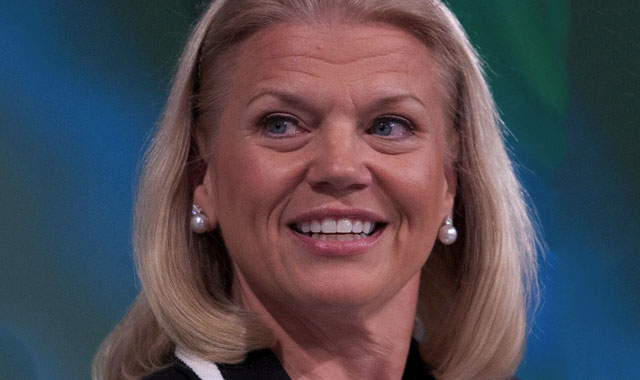
When IBM shareholders gather on Tuesday, they’ll be asked to sign off on a US$33m (R428m) pay package for CEO Ginni Rometty.
It’s a hefty sum for any CEO, let alone one who’s overseen five years of falling revenue and left shareholders with a total return of less than 0,1%.
And the truth is, that figure might understate her actual compensation — by perhaps 50% or more, because of the way IBM values her stock options.
According to proxy adviser Institutional Shareholder Services, Rometty’s 2016 package may actually exceed $50m, based on its own estimate for the value of her options at the time they were granted.
Independent calculations by Bloomberg also suggest that at current values — which take into account the rise in IBM’s share price since the grant — her compensation is now worth $65m, or almost twice as much as her reported pay.
This disparity — between what companies say they pay and what CEOs actually get — reflects the imprecise art of valuing stock options, which involves a complex, and at times opaque, numbers game. By tweaking certain assumptions, awards disclosed in regulatory filings can appear smaller than they really are. While it’s legal and even fairly common, the particulars of Rometty’s case have raised more than a few eyebrows.
“Their valuation is very unusual,” John Core, a professor of accounting at MIT’s Sloan School of Management, said of IBM’s valuation of Rometty’s options. “There’s certainly a measure of discretion in these models, although this seems to be on the more extreme side.”
Ed Barbini, a spokesman for IBM, said the company has used the same methodology to value option grants for more than a decade, in accordance with generally accepted accounting principles and US Securities and Exchange Commission regulations. Neither Rometty nor the directors responsible for setting her pay were available to comment, he said. PricewaterhouseCoopers, which audited IBM’s books, also declined to comment.
The company, which awarded Rometty 1,5m stock options on a one-time basis in January 2016, valued the grant at $12,1m. That came on top of her normal compensation, consisting of about $21m in salary, bonus and shares. IBM didn’t disclose any of its assumptions for valuing the options and declined to do so when asked by Bloomberg.
ISS sees Rometty’s grant as a red flag. Based on its calculations, the award is almost 60% below the proxy adviser’s own “fair value” estimate of about $29m. That’s the biggest gap for S&P 500 companies that granted options to executives last year. The grant is a big reason that ISS took the rare step of recommending IBM shareholders — which include billionaire investor Warren Buffett’s Berkshire Hathaway, and fund giants Vanguard Group and BlackRock — vote down the pay programme.

Rival proxy adviser Glass Lewis & Co also said investors should give it a thumbs down, though it didn’t comment on the valuation of Rometty’s options.
While “say on pay” votes are non-binding, anything below 70% approval can not only be highly embarrassing for company directors, but could also lead to unwanted scrutiny and activist investor campaigns. Vanguard and BlackRock declined to say how they will vote, while Berkshire didn’t respond to a request for comment.
Black-Scholes
Of course, there are any number of possible reasons that IBM’s valuation might differ from those made by Bloomberg and ISS.
Both Bloomberg and ISS use the Black-Scholes model, a widely accepted standard for pricing options. It’s the same methodology that IBM employs. However, board compensation committees that divvy up grants into portions with different exercise prices and vesting hurdles, which IBM did with Rometty, sometimes use a combination of the Monte Carlo and binomial lattice models. Inputs such as volatility, dividend yield and expected life of the security can drastically impact its fair value.
If anything, the sheer amount of wiggle room is a big part of the problem. And the hypotheticals involved shine a light on the black-box maths that underlies many executive compensation packages.
Helped by last year’s 21% rebound in IBM shares, Rometty’s pay package is currently worth $65m, according to the Bloomberg Pay Index. That’s higher than any of her closest industry rivals, like Microsoft’s Satya Nadella and Hewlett Packard Enterprise’s Meg Whitman, and puts her among America’s 10 best-paid CEOs.
‘She’s Overpaid’
Long-term IBM shareholders, on the other hand, have almost nothing to show for their investment during Rometty’s tenure. Since she became CEO in January 2012, IBM has returned 0,05%. That’s including dividends. (Based on price alone, shares have fallen 13%.) The S&P 500 has more than doubled over the same span and technology companies have, on average, returned even more.
“She’s overpaid,” said Tigress Financial Partners’ Ivan Feinseth. “She has not created shareholder value in five years.”
To be fair, Rometty, 59, rose to prominence as the first woman CEO in IBM’s 105-year history at a difficult time.
She had the unenviable task of playing catch-up as she tried to shift IBM away from shrinking businesses such as computers and operating system software, and into higher growth areas like the cloud and AI. Rometty also inherited her predecessor’s promise that IBM’s earnings would reach $20/share by 2015, which some analysts say pushed her into short-sighted decisions such as buybacks and divestments that ultimately cost the company time and money.
While Rometty finally abandoned the profit target in late 2014, she still hasn’t been able to right the ship. Last week, IBM reported that revenue in the first quarter fell to a 15-year low, and analysts predict sales will continue to shrink for another year. Gross margins fell by the most in at least a decade.
How IBM got to $12,1m for Rometty’s option grant remains a mystery. But generally, equity planners agree the process is the same for most companies.
It usually goes like this: the board sets a dollar value for the award, and then tasks compensation experts to reverse engineer a structure that results in the lowest possible per-option price. The cheaper each option is, the more can get crammed into the award. That way, an executive stands to reap the maximum number of shares while reported pay figures will remain under control for shareholders and governance watchdogs alike.

“It is striking that the values are so different” in IBM’s case, said Barbara Baksa, executive director at the National Association of Stock Plan Professionals. “There’s definitely some judgment calls there that have a very significant impact on the value of the option. If you knew those, you’d know the secret of the difference.”
Low-balling also helps a company’s bottom line. It reduces stock-based compensation costs and can boost the tax deduction a company gets when the options are exercised. Bigger deductions also happen to improve EPS, a key financial metric that IBM has repeatedly emphasised over the years.
Timely award
Whatever the case, the option grant was particularly timely for Rometty. It was awarded on 26 January 2016, just days after IBM shares hit a more than five-year low, to underscore the board’s “strong confidence” in her leadership.
Soon after, IBM’s stock began to rebound. And even though the options came with strike prices between 5% and 25% above the share price on the grant date — a shareholder-friendly performance condition — all were in the money in less than six months. (The stock could still fall below those hurdles before she has a chance to exercise the options, making them worthless.)
To Greenwich Wealth Management’s Vahan Janjigian, Rometty is already getting much too much — irrespective of what her package might actually be worth.
“I don’t think it’s deserved,” said Janjigian, whose firm owns IBM shares. He declined to say how it will vote. The stock “has done well since it hit the bottom, but I don’t think she should be rewarded for that”. — (c) 2017 Bloomberg LP

